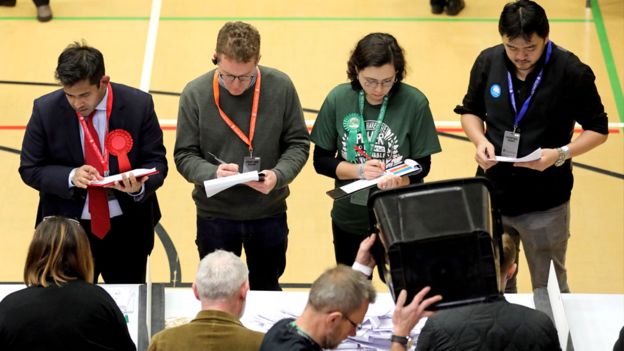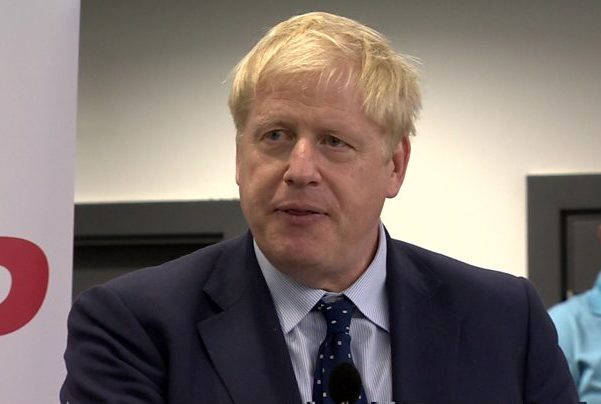The Conservatives have won an overall majority in the general election, passing the 326 threshold with seats still to declare.
The BBC forecasts that Boris Johnson will return to Downing Street with a majority of 74.
The prime minister said it would give him a mandate to “get Brexit done” and take the UK out of the EU next month.
Labour have had a disappointing night, with leader Jeremy Corbyn saying he would not fight a future election.
Labour have lost seats across the North, Midlands and Wales in places which backed Brexit in 2016.
The result so far is remarkable for the Conservatives – better than many of them had hoped for.
They are on course for the majority which will allow Boris Johnson to make sure Brexit happens next month.
There were some astonishing results, with a number of historic Labour heartlands falling to the Conservatives.
Labour, by contrast, could hardly be in a worse position.
Jeremy Corbyn has made it clear he will go before the next election – but he wants to stay for a period of reflection. Many in his party want him to go immediately.
In Scotland, the picture is quite different.
The SNP have come close to sweeping the board – gaining seats from all their rivals.
A Tory majority at Westminster means one constitutional quarrel – Brexit – might be over, but another – on Scottish independence – will be back with a vengeance.
Speaking at his election count in Islington North, where he was re-elected with a reduced majority, Mr Corbyn said Labour had put forward a “manifesto of hope” but “Brexit has so polarised debate it has overridden so much of normal political debate”.
He also took a swipe at “media intrusion” – and said he would not lead the party into the next election, but would stay on while a period of “reflection” takes place.
Speaking after he was re-elected in Uxbridge, west London, with a slightly higher majority, Prime Minister Boris Johnson said: “It does look as though this One Nation Conservative government has been given a powerful new mandate to get Brexit done.”
In other developments:
- Jo Swinson – who only became Lib Dem leader in July and began the election campaign by saying she aimed to be prime minister – lost her Dunbartonshire East seat to the SNP by 149 votes
- Nigel Dodds, the leader of the Democratic Unionist Party, lost his Belfast North seat to Sinn Fein
- The Lib Dems took Richmond Park, south-west London, from Conservative minister Zac Goldsmith
- Labour’s Caroline Flint – who backed the Tory Brexit deal in defiance of her party – lost in Don Valley to Mr Johnson’s party
Scottish National Party leader and Scotland’s First Minister Nicola Sturgeon said it had been an “exceptional night” for her party.
She said Scotland had sent a “very clear message” that it did not want a Boris Johnson Conservative government and that the prime minister did not have a mandate to take Scotland out of the EU.
It was also a “strong endorsement” for Scotland having a choice over its own future in another independence referendum, something that a majority Conservative government would be reluctant to grant.
Labour looks set for one of its worst election results since World War Two.
Some traditional Labour constituencies, such as Darlington, Sedgefield and Workington, in the north of England, will have a Conservative MP for the first time in decades – or in the case of Bishop Auckland and Blyth Valley – for the first time since the seat was created.
Labour took Putney, in south-west London, from the Tories, in a rare bright spot for Jeremy Corbyn’s party.
The BBC forecast suggests the Tories will get 362 MPs, Labour 199, the SNP 52, the Lib Dems 13, Plaid Cymru four, the Greens one, and the Brexit Party none.

A row has already broken out at the top of the Labour Party, with some candidates blaming Jeremy Corbyn’s unpopularity on the doorstep and others blaming the party’s policy of holding another Brexit referendum.
Leave-supporting Labour chairman Ian Lavery, who held his seat with a reduced majority, said he was “desperately disappointed”, adding that voters in Labour’s “heartlands” were “aggrieved” at the party’s Brexit stance.
Downing Street said that if the exit poll was correct, and Mr Johnson was returned to Downing Street, there would be a minor cabinet reshuffle on Monday.
The Withdrawal Agreement Bill, paving the way for Brexit on 31 January, would have its second Commons reading on Friday, 20 December.
A major reshuffle would take place in February, after the UK has left the EU, No 10 added, with a Budget statement in March.



